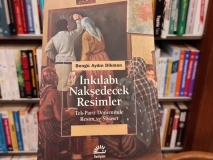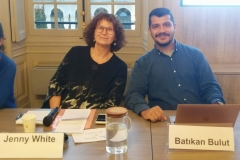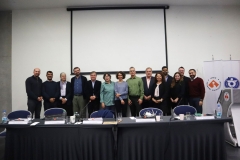
FACULTY OF BUSINESS
Department of Political Science and International Relations
PSIR 325 | Course Introduction and Application Information
| Course Name |
Constitutionalism and Democracy
|
|
Code
|
Semester
|
Theory
(hour/week) |
Application/Lab
(hour/week) |
Local Credits
|
ECTS
|
|
PSIR 325
|
Fall/Spring
|
3
|
0
|
3
|
6
|
| Prerequisites |
None
|
|||||
| Course Language |
English
|
|||||
| Course Type |
Elective
|
|||||
| Course Level |
First Cycle
|
|||||
| Mode of Delivery | - | |||||
| Teaching Methods and Techniques of the Course | - | |||||
| Course Coordinator | ||||||
| Course Lecturer(s) | ||||||
| Assistant(s) | ||||||
| Course Objectives | This course aims to analyze the relationship between law and politics by focusing on the topic of constitutionalism. The course aims to employ a conceptual discussion on the subject of constitutionalism and shed light on the complex relationship between constitutionalism and democracy. |
| Learning Outcomes |
The students who succeeded in this course;
|
| Course Description | The course is composed of three parts. The first part focuses on theoretical questions, the second part aims to explain the reasons behind the growing influence of constitutionalization in contemporary politics and the third part discusses all these issues through a case study of Turkey. |
|
|
Core Courses | |
| Major Area Courses |
X
|
|
| Supportive Courses | ||
| Media and Management Skills Courses | ||
| Transferable Skill Courses |
WEEKLY SUBJECTS AND RELATED PREPARATION STUDIES
| Week | Subjects | Related Preparation |
| 1 | Introduction and outline of the course | |
| 2 | What is Constitutionalism? | Whittington, K. E. (2008). Constitutionalism. In Wittington, K. E., Kelemen, R. D. & Calderira, G. A. (eds) The Oxford Handbook of Law and Politics (pp. 281-99). Oxford: Oxford University Press. Sunstein, C. R. (1993). Constitutions and Democracies: an epilogue. In Elster, J. & Slagstad, R. (eds.) Constitutionalism and Democracy (pp.327-357). Cambridge: Cambridge University Press. Alexander, L. (2005). Constitutionalism. In Golding, M. P. & Edmundson W. A. (eds) The Blackwell Guide to the Philosophy of Law and Legal Theory (pp.248-258). Malden: Blackwell Publishing. |
| 3 | Constitutionalism, Democracy and Rights (I): Hayek | Hayek, F. A. (1978). The Constitution of Liberty. China Social Sciences Publishing House, Chengcheng Book Ltd. [Introduction, pp. 1-11; Chapter 1, pp.11-22; Chapter 14, pp.205-220] |
| 4 | Constitutionalism, Democracy and Rights (II): Dworkin | Dworkin, R. (2005). Freedom‘s Law. New York: Oxford University Press. [Introduction: The Moral Reading and the Majoritarian Premise, pp.1-38] |
| 5 | Constitutionalism, Democracy and Rights (III): Habermas | Habermas, J. (1996). Between Facts and Norms: Contributions to a Discourse Theory of Law and Democracy. (Rehg, W., Trans). Cambridge: The MIT Press. [Chapter 3.1, pp.84-104; Chapter 3.3, pp.118-131] |
| 6 | Constitutionalism, Democracy and Rights (IV): Rorty | Rorty, R. (1989). Contingency, Irony and Solidarity. Cambridge: Cambridge University Press. [Introduction, pp.xiii-xvi; Chapter 3, pp.44-69] |
| 7 | Constitutionalism, Democracy and Rights (V): Waldron | Waldron, J. (1999). Law and Disagreement. Oxford: Clarendon Press. [Chapter 13, pp.282-312] |
| 8 | MIDTERM EXAM | |
| 9 | Theories on Judicialization of politics (I) | Ginsburg, T. (2008). The Global Spread of Constitutional Review. In Wittington, K. E., Kelemen, R. D. & Calderira, G. A. (eds) The Oxford Handbook of Law and Politics (pp. 81-98). Oxford: Oxford University Press. Hirschl, R. (2008). The Judicialization of Politics. In Wittington, K. E., Kelemen, R. D. & Calderira, G. A. (eds) The Oxford Handbook of Law and Politics (pp.119-141). Oxford: Oxford University Press. |
| 10 | Theories on Judicialization of politics (II) | Hirschl, R. (2004). The political origins of the new constitutionalism. Indiana Journal of Global Legal Studies, 11(1), 71-108. |
| 11 | The birth of constitutionalism in Turkey | Özbudun, E. & Gençkaya, Ö.F. (2009). Democratization and the Politics of Constitution-Making in Turkey. Budapest: CEU Press. [Chapter 1, pp. 7-26} Ahmad, F. (1977). The Turkish Experiment in Democracy: 1950-1975. London: C. Hurst & Company. [Chapter 6, pp.147-177] |
| 12 | Comparison of Turkey’s constitutions | 1924 Constitution in English: Earle, E. M. (1925). The New Constitution of Turkey. Political Science Quarterly, 40 (1), 73-100. 1961 Constitution in English: http://www.anayasa.gen.tr/1961constitution-text.pdf 1982 Constitution in English: https://global.tbmm.gov.tr/docs/constitution_en.pdf |
| 13 | The Constitutional Court of Turkey’s interpretation of the constitution | Shambayati, H., & Kirdiş, E. (2009). In pursuit of “contemporary civilization”: judicial empowerment in Turkey. Political Research Quarterly, 62(4), 767-780. Belge, C. (2006). Friends of the Court: the Republican alliance and selective activism of the Constitutional Court of Turkey. Law & Society Review, 40(3), 653-692. |
| 14 | Summary and concluding remarks | |
| 15 | Semester Review | |
| 16 | Final Exam |
| Course Notes/Textbooks | There is no single textbook.
*All course readings are available at the University Library and as open sources. |
| Suggested Readings/Materials |
EVALUATION SYSTEM
| Semester Activities | Number | Weigthing |
| Participation | ||
| Laboratory / Application | ||
| Field Work | ||
| Quizzes / Studio Critiques | ||
| Portfolio | ||
| Homework / Assignments | ||
| Presentation / Jury |
1
|
20
|
| Project | ||
| Seminar / Workshop | ||
| Oral Exams | ||
| Midterm |
1
|
40
|
| Final Exam |
1
|
40
|
| Total |
| Weighting of Semester Activities on the Final Grade |
2
|
60
|
| Weighting of End-of-Semester Activities on the Final Grade |
1
|
40
|
| Total |
ECTS / WORKLOAD TABLE
| Semester Activities | Number | Duration (Hours) | Workload |
|---|---|---|---|
| Theoretical Course Hours (Including exam week: 16 x total hours) |
16
|
3
|
48
|
| Laboratory / Application Hours (Including exam week: '.16.' x total hours) |
16
|
0
|
|
| Study Hours Out of Class |
16
|
4
|
64
|
| Field Work |
0
|
||
| Quizzes / Studio Critiques |
0
|
||
| Portfolio |
0
|
||
| Homework / Assignments |
0
|
||
| Presentation / Jury |
1
|
15
|
15
|
| Project |
0
|
||
| Seminar / Workshop |
0
|
||
| Oral Exam |
0
|
||
| Midterms |
1
|
17
|
17
|
| Final Exam |
1
|
25
|
25
|
| Total |
169
|
COURSE LEARNING OUTCOMES AND PROGRAM QUALIFICATIONS RELATIONSHIP
|
#
|
Program Competencies/Outcomes |
* Contribution Level
|
||||
|
1
|
2
|
3
|
4
|
5
|
||
| 1 | To be able to use the theoretical and practical knowledge acquired in the areas of Political Science and International Relations. |
X | ||||
| 2 | To be able to have the basic knowledge of, and make use of other disciplines which contribute to the areas of Political Science and International Relations. |
|||||
| 3 | To be able to distinguish the differences between classical and contemporary theories and to assess their relationship. |
X | ||||
| 4 | To be able to recognize regional and global issues, and develop solutions based on research. |
|||||
| 5 | To be able to assess the acquired knowledge and skills in the areas of Political Science and International Relations critically. |
X | ||||
| 6 | To be able to transfer ideas and proposals on issues in the areas of Political Science and International Relations to other people and institutions verbally and in writing. |
|||||
| 7 | To be able to identify the historical continuity and changes observed in the relations between the actors and institutions of national and international politics. |
|||||
| 8 | To be able to examine concepts, theories, and developments with scientific methods in the areas of Political Science and International Relations. |
X | ||||
| 9 | To be able to take responsibility as an individual and as a team member. |
|||||
| 10 | To be able to act in accordance with the scientific and ethical values in studies related to Political Science and International Relations. |
X | ||||
| 11 | To be able to collect data in the areas of Political Science and International Relations and communicate with colleagues in a foreign language ("European Language Portfolio Global Scale", Level B1). |
|||||
| 12 | To be able to speak a second foreign at a medium level of fluency efficiently. |
|||||
| 13 | To be able to relate the knowledge accumulated throughout human history to their field of experience. |
|||||
*1 Lowest, 2 Low, 3 Average, 4 High, 5 Highest
NEWS |ALL NEWS

Sıtkı Egeli participated as a guest speaker at the HCOC Seminar
Faculty member of IUE Political Science and International Relations, Assoc. Prof. Dr. Sıtkı Egeli participated as a guest speaker at the HCOC

Umut Can Adısönmez's New Article Published in the Journal "Critical Studies on Security"
Faculty member of IUE Political Science and International Relations, Dr. Umut Can Adısönmez and Assoc. Prof. Laçin İdil Öztığ from Yıldız Technical

Dr. Bengü Aydın Dikmen's new book "İnkılabı Nakşedecek Resimler" is published!
Bengü Aydın Dikmen focuses on the painting policy during the foundation and construction period of the Republic. In this way, she also

Serhun Al and Umut Can Adısönmez Lectured on Conflict Resolution and Peace Building
Faculty member of IUE Political Science and International Relations, Dr. Serhun Al and Dr. Umut Can Adısönmez, participated as trainers in the

Umut Can Adısönmez participated in the "Human Security and Resilience in South East Europe" Panel
Faculty member of IUE Political Science and International Relations, Dr. Umut Can Adısönmez participated in the panel discussion "Human Security and Resilience

We Organized Our Republican Centennial Symposium
As the IUE Political Science and International Relations Department, we organized a symposium on the Centennial of our republic. In the symposium

Batıkan Bulut presented his proceeding on the CEST 2023 Paris Symposium
Research assistant of the IUE Department of Political Science and International Relations, Batıkan Bulut presented his paper titled "Civil Society and Competitive



